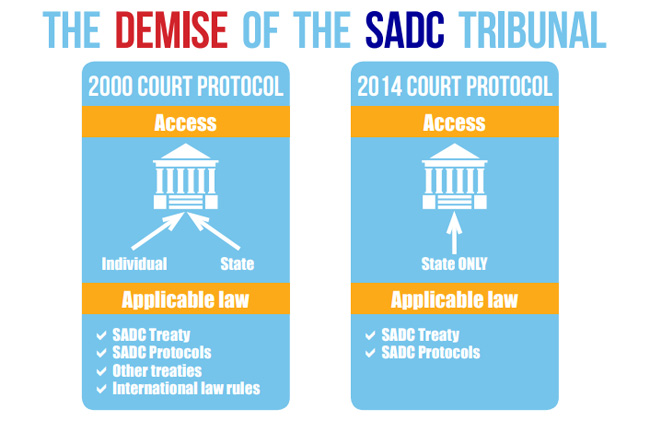On 18 November 2005, the Southern Africa Development Community Tribunal (SADC Tribunal) was inaugurated as a judicial body established to resolve disputes between Southern African states and between states and their citizens. At that time, there were many celebrations around the inauguration of the Tribunal because a regional court with the power to hear human rights cases is a critical mechanism in the pathway to justice after exhaustion of local remedies. However, the celebrations were short-lived. In 2009, Zimbabwe challenged the legitimacy of the Tribunal stating that it had not been established according to international law norms. This led to suspension of the Tribunal by decision of SADC leaders, in 2010.
![]() Download this statement
Download this statement![]() Download the flyer
Download the flyer
In 2014, the Protocol establishing the SADC Tribunal was revised to remove the Tribunal’s power to hear disputes brought by citizens against states and its mandate was restricted to hear disputes between SADC member States only. In 2015, SADC leaders approved a resolution to establish a new Tribunal, called the SADC Administrative Tribunal (SADCAT). The new Tribunal has jurisdiction only to hear administrative matters between SADC states and SADC secretariat staff, while under the revised Protocol the SADC Tribunal will hear interstate disputes only. Neither the SADC Tribunal nor the newly created SADCAT will have human rights jurisdiction and individuals will no longer have direct access to them. To this end, the adoption of the revised SADC Tribunal Protocol in 2014 resulting in the effective elimination of the regional human rights court in the Southern Africa region is not in keeping with international and regional efforts to promote access to justice in the SADC region. The steps taken by States in the region constitute a retrogressive step and further impediment to individuals’ access to justice and effective remedies for human rights violations.
The Tribunal was suspended at a time it had started establishing itself as a well-respected international tribunal providing remedies and jurisprudence appropriate to the needs of SADC nationals. By dismantling the court, SADC Heads of States and Government betrayed their commitment to fighting impunity and exposed themselves as proponents of human right violations and impunity of international crimes. This is worrying given the fact that some African states are vocal in their dissatisfaction with the International Criminal Court (ICC). With such discontent it is only logical that they should instead direct their focus toward strengthening their own domestic and regional institutions, legal frameworks and mechanisms to effectively promote the rule of law, human rights, access to justice and peaceful resolution of conflicts.
This year, instead of celebrating the 12th anniversary of the SADC Tribunal, we mourn its demise. We call on all SADC citizens to join us as we mourn for the demise of SADC Tribunal. The revised SADC Tribunal Protocol, adopted in August 2014, effectively buried the SADC Tribunal. As it now stands, the 2014 Protocol deprives the SADC citizens their right to refer a dispute between themselves and their Governments to the SADC Tribunal. Without a meaningful tribunal, justice and redress will remain elusive for people of the region. As SADC citizens, we remain resolute in our own discontent with the devastating whims of our leaders that heighten vulnerability and expose citizens to state sanctioned violations among other human right violations. We affirm our concerted and unequivocal demand for justice from those we have entrusted to lead us, to hear and act on our human rights demands.
The Coalition for an Effective SADC Tribunal calls on all concerned SADC citizens to join us as we mourn for our SADC Tribunal and call upon SADC leaders to bring back the Tribunal in its original form.
Contacts:
Prof Frans Viljoen, frans.viljoen@up.ac.za, Centre for Human Rights, University of Pretoria
Corlett Letlojane, corlett@hurisa.org.za, Human Rights Institute of South Africa (HURISA)
Dr Aquinaldo Mandlate, aquinaldom@salc.org.za, Southern Africa Litigation Centre (SALC)
Signed by the following members of the Coalition for an Effective SADC Tribunal:
- Associação Justiça, Paz e Democracia (Angola)
- Auwal Socio-Economic Research Institute (South Africa)
- African Women’s Millennium Initiative in Zambia (Zambia)
- Botswana Council for NGO’s (Botswana)
- Centre for Human Rights and Rehabilitation (Malawi)
- Centre For Human Rights, University of Pretoria (South Africa)
- Centro de Estudos Moçambicanos e Internacionais (Mozambique)
- Crisis in Zimbabwe Coalition (South Africa)
- Citizen Engagement Platform Seychelles (Seychelles)
- CIVICUS (South Africa)
- CORMSA (South Africa)
- Ditshwanelo (Botswana)
- Human Rights Institute of South Africa (South Africa)
- Lawyers for Human Rights (South Africa)
- Lawyers for Human Rights-Swaziland (Swaziland)
- League for Human Rights (Mozambique)
- Legal Assistance Centre (Namibia)
- Legal Resources Centre (South Africa)
- Lesotho Council of NGOs (Lesotho)
- Malawi Law Society (Malawi)
- Paralegal Alliance Network (Zambia)
- SADC Council of Non-Governmental Organizations (Botswana)
- Southern Africa Litigation Centre (South Africa)
- Southern African Christian Initiative (Namibia)
- Southern African Development Community Lawyers Association (SADC LA)
- Zimbabwe Exiles Forum (South Africa)
- Zimbabwe Lawyers for Human Rights (Zimbabwe)
- Zimbabwe Human Rights NGO Forum (Zimbabwe)


